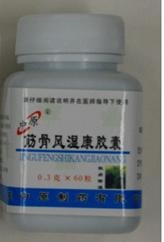Information on oral Non-Steroidal Anti-Inflammatory Drugs
Preface |
Non-Steroidal Anti-inflammatory Drugs (NSAIDs) are a group of medicines that have analgesic (pain killing), anti-inflammatory (reduce inflammation, which is a body reaction that may cause redness, swelling, pain and hotness) and antipyretic (lowering temperature) properties.
NSAIDs work by interfering with certain enzymes called cyclo-oxygenase (COX) in your body. COX enzymes control the production of chemicals called prostaglandins, which is responsible for many of your cellular responses and pathophysiological processes.
There are two different COX enzymes, known as COX-1 and COX-2. COX-1 presents in the gastrointestinal tract for protecting the stomach from acid and in blood, responsible for the aggregation of platelet. COX-2 primarily regulates the release of prostaglandins that are responsible for pain and inflammation. When release to brain, prostaglandins can cause fever. |
|
 |
|
▲ back to top
Classification of NSAIDs |
NSAIDs that act on different COX enzymes will have different pharmacological effects and side effects. Based on the types of COX enzymes they targeted, NSAIDs can be classified as:
- Non-selective NSAIDs – which block the effects of both COX-1 and COX-2 enzymes.
- COX-2 inhibitors – which only block the effects of COX-2 enzymes. In this connection, they will have a lower risk of bleeding in stomach.
Common NSAIDs
The commonly used NSAIDs in Hong Kong include:
- Non-selective NSAIDs - ibuprofen, diclofenac, indomethacin, ketoprofen, ketorolac, mefenamic acid, naproxen and piroxicam.
- COX-2 inhibitors - celecoxib and etoricoxib.
Most of the commonly used NSAIDs (e.g.,diclofenac tablet and mefenamic acid capsule) can only be obtained from pharmacy with a prescription. Some NSAID (e.g., ibuprofen tablet) can be sold without prescription but only by or under the supervision of a registered pharmacist in a registered pharmacy.
|
|
Aspirin
Aspirin is a NSAID developed a hundred years ago and has been widely used in the past. However, due to its side effects and the availability of other alternatives, aspirin is now mainly used at low dose on high risk patients to prevent platelet aggregation.
Platelets are important in clotting. However, for patients with history of stroke or heart attack, hypertension and diabetes, aggregation of platelet will increase the risk of cardiovascular or cerebrovascular diseases. Low dose aspirins are used on high risk patients to prevent thrombotic events (e.g. myocardial infarction and stroke).
Use of aspirin in children under 16 has been associated with the development of Reye's syndrome, a serious and potentially life-threatening condition. Therefore, aspirin-containing preparations should not be given to children under 16 years.
Although aspirin is an over-the-counter medicine, the routine use of low-dose aspirin for people without a pre-existing risk factor such as heart attack or stroke is not recommended because the risks associated with treatment, such as stomach ulcers and internal bleeding, are thought to outweigh any benefits.
|
|
|
|
|
▲ back to top
Clinical Use |
The three main uses of NSAIDs include:
- Relieving mild to moderate pain
- Reducing acute and chronic inflammation
- Bringing down fever
NSAIDs are available in different dosage forms. They include oral (e.g. tablet, capsules and liquid), external (e.g. gel, cream and suppository) and injectables. |
Pain Relief |
When given in single dose, NSAIDs have analgesic activity comparable to that of paracetamol. In regular full dosage, NSAIDs have both a lasting analgesic and an anti-inflammatory effect which make them particularly useful for the treatment of continuous pain associated with inflammation. NSAIDs can also be of benefit in other painful condition such as back pain and soft-tissue disorders.
|

|
Rheumatoid Arthritis
Rheumatoid Arthritis is an autoimmune disorder that causes inflammation of joints. Patients may suffer from joint pain and stiffness. NSAIDs will relieve pain and swelling in the affected joints but they will not slow down the progression of rheumatoid arthritis.
|
|
▲ back to top
Side Effects |
The risks of adverse effects depend on the type, the amount and the duration of NSAIDs consumed. In general, COX-2 inhibitors have less adverse events on the stomach but higher risk to cause side effects on the heart compared with non-selective NSAIDs. Adverse events are also more likely to occur in people taking NSAIDs in high dose or for long period of time. Side effects are also more common among elderly patients. Seek your doctor’s advice on the best treatment option.
Common adverse effects of NSAIDs include nausea, vomiting, diarrhea, constipation and decreased appetite. NSAIDs may also cause fluid retention, leading to edema.
Less common adverse effects of NSAIDs include:
- Headache, dizziness, nervousness, depression, drowsiness, insomnia, vertigo
- When used in high dose and for long period of time, may be associated with a small increased risk of thrombotic events (e.g. myocardial infarction and stroke) and the risk is higher with COX-2 inhibitors
- Prolonged bleeding time
- Patients with asthma or allergic disorders are more prone to be allergic to NSAIDs which severe skin reactions and angioedema may occur
- In rare cases, NSAIDs may affect liver and kidney, especially among those with existing liver or kidney problems
|
|
▲ back to top
Special considerations for different patient groups |
Pregnant women
The use of NSAIDs during pregnancy is not recommended. NSAIDs should never been taken from the 30th week of pregnancy onwards.
Breastfeeding women
The use of NSAIDs during breastfeeding is not recommended unless healthcare professional advise that the benefits of treatment outweigh the risks to your baby.
Women at childbearing age
Long term use of some NSAIDs (e.g., diclofenac and mefenamic acid) may be associated with reduced female fertility, which is reversible on stopping treatment. Their uses are not recommended in women attempting to conceive.
Elderly
NSAIDs should be used with caution in the elderly owing to the increased susceptibility of the elderly to the side-effects.
Patients with gastro-intestinal ulceration or bleeding
Patients with active gastro-intestinal ulceration or bleeding should not take any NSAIDs. Patients with any history of gastro-intestinal bleeding, ulceration, or perforation should not take piroxicam, ketoprofen, and ketorolac.
Patients with cardiovascular and kidney conditions
In rare cases, NSAIDs can damage the kidneys and cardiovascular system (heart and blood vessels). Therefore, the use of NSAIDs is not usually recommended for people with pre-existing risk factors for cardiovascular or kidney conditions. Patients with severe heart failure should not take any NSAIDs.
Asthmatic patients
Asthmatic patients should take NSAIDs with care as some people with asthma find that taking a NSAID can make their asthma symptoms more severe.
Doctors or pharmacists will use the most appropriate form and dosage after considering the risk and benefits of NSAIDs. Patients are advised to follow doctor’s or pharmacist’s instructions in using the drugs.
|
|
▲ back to top
Reduce your risks of NSAIDs’ side effects |
NSAIDs are widely used to treat a number of diseases and conditions. It can be very effective treatment with acceptable side effects when used carefully under the supervision of healthcare professionals. It is always prudent to consult your doctor/ pharmacist before taking NSAIDs, especially if you are taking them for a long period of time, or in high doses because your reaction to the medication should be closely monitored. |
|
 |
Communication with your doctor
- NSAIDs should be used under medical supervision.
- Seek your doctor’s advice on the best treatment option. Sometimes, non-pharmacological options and simple analgesics like paracetamol work equally well. Topical NSAIDs can be effective for transient or localized pain and has less systemic side effects. Certain NSAID may be in preference to another because of lower risk of a particular complication .
- Inform your doctor of your drugs and medical history because other drugs may interact with NSAIDs and some diseases may warrant special precautions.
- Inform your doctor or pharmacist that you are pregnant or breast-feeding.
- Seek medical advice as soon as possible if you experience any side effects suspected to be related to NSAIDs, such as stomach pain, ringing in the ear and high blood pressure.
- Have regular follow-ups as advised by your doctor.
Taking oral NSAIDs
- Take oral NSAIDs as advised by your doctor. In general, they are taken with milk or food. For cases intolerant to gastrointestinal side effects, doctor may prescribe enteric-coated formulations, or change the route of administration to reduce symptoms such as dyspepsia.
- If you have to take oral NSAIDs on a long-term basis, you are at an increased risk of developing stomach ulcers and bleeding, you will probably be given an additional medication to protect your stomach.
Lifestyle and behavioral modification
- You are advised to avoid smoking and drinking large amounts of alcohol as these activities can increase your risk of developing a stomach ulcer.
|
|
▲ back to top
Storage of drugs
Drugs should be stored in a cool dry place. Unless specified on the label, medicines should not be stored in refrigerators. Furthermore, drugs should be kept properly in places unreachable by children to prevent accidental ingestion. |
|
|
|
▲ back to top
Proper use of health products |
There are many health products in the market which claimed to be suitable for painful conditions. It is not uncommon that patients with acute or chronic pain consume these health products to relieve their symptoms. They sometimes purchase these products from local and overseas markets.
Department of Health has previously received reports of patients feeling unwell after taking these products. Analysis of samples revealed that these products were adulterated with NSAIDs. Some products were adulterated with a few kinds of NSAIDs and even corticosteroid which pose a great danger to the health. In severe cases, patients suffered from impaired liver or kidney function had severe sequelae. You may wish to refer to the link for “Products found to contain undeclared medicines” of Drug Office website for more information.
For any discomfort or illnesses, patients should work with their doctors and follow their treatment plan to control the diseases. Use of health products without health professional’s advice may not only affect the control of diseases, but also cause illnesses or even life threatening consequences due to drug interactions. Public should consult their family doctors, pharmacists or health professionals before consuming any health products and should not use health products to manage diseases just because of the claims they made. |
|
 |
|
▲ back to top
|

